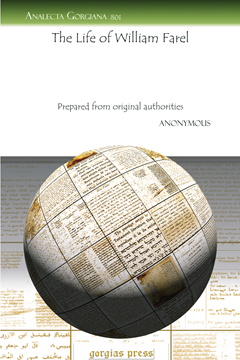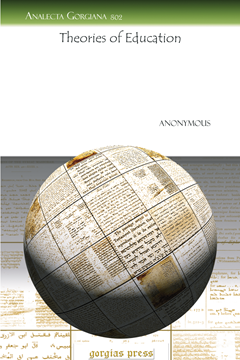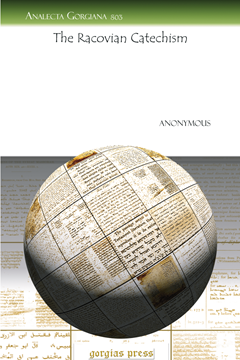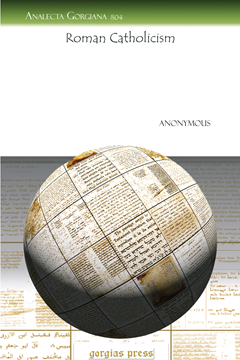The Life of William Farel
Prepared from original authorities
By Anonymous
Series: Analecta Gorgiana 801
ISBN: 978-1-61143-179-7
The reviewer examines a biography of Protestant Reformer William Farel. The book describes Farel’s departure from Catholicism and contributions to the efforts of Swiss Reformation, Zuingle in particular. His trails and successes are described.
$35.00 (USD)
Theories of Education
By Anonymous
Series: Analecta Gorgiana 802
ISBN: 978-1-61143-180-3
The author attacks practices common in newer forms of education. He generally calls for a more conservative, less experimental, approach which emphasizes deep general knowledge. No formal method is offered to replace the broken system.
$34.00 (USD)
The Racovian Catechism
By Anonymous
Series: Analecta Gorgiana 803
ISBN: 978-1-61143-181-0
The author provides the biography of Socianism founder Faustus Socinus. The article provides a partial translation of his posthumously compiled “Racovian Catechism” from the original Polish with the intention of revealing information about Socianism.
$36.00 (USD)
Roman Catholicism
By Anonymous
Series: Analecta Gorgiana 804
ISBN: 978-1-61143-182-7
A scathing polemic against Roman Catholicism, the author uses logical and textual evidence to contradict Catholic rituals and beliefs.
$35.00 (USD)
Hints on Colonization and Abolition
With reference to the black race
By Anonymous
Series: Analecta Gorgiana 806
ISBN: 978-1-61143-184-1
The author attacks American slavery but disputes the call to instant abolition and race-mixing. He advocates the American Colonization Society’s “back-to-Africa” approach as well as a slow, political approach to ending slavery in America.
$36.00 (USD)
An Apology for Conforming to the Protestant Episcopal Church
Contained in a series of Letters addressed to the Reverend Benjamin T. Onderdonk, D.D., Bishop of the Diocese of New York. By Thomas S. Brittan.
By Anonymous
Series: Analecta Gorgiana 808
ISBN: 978-1-61143-186-5
The article reviews a text by a convert from Presbyterianism to the Protestant Episcopal Church. The reviewer is critical of much of the evidence the author uses and declares the book to be poor in quality and unoriginal.
$36.00 (USD)
Quakerism not Christianity
Or Reasons for renouncing the doctrine of Friends. In three parts. By Samuel Hanson Cox, D.D., Pastor of the Laight Street Presbyterian Church; and for twenty years a member of the Society of Friends. Pp. 686.
By Anonymous
Series: Analecta Gorgiana 810
ISBN: 978-1-61143-188-9
The article reviews a book which is highly critical of Quakerism. The reviewer relates a brief history of Quakerism and proceeds to challenge Quaker doctrines. Quakerism is described as an incorrect form of Christianity.
$36.00 (USD)
Memoir of the Rev. George Burder, author of “Village Sermons,” and Secretary of the London Missionar
By Henry Foster Burder, DD
By Anonymous
Series: Analecta Gorgiana 811
ISBN: 978-1-61143-189-6
The article reviews the memoir of Rev. George Burder. The reviewer outlines the reverend’s family, his entrance to the ministry, his shift into missionary work, his preaching, and his hardships. The reviewer judges his style and persona.
$35.00 (USD)
A Treatise on the Parables of our Lord
Series: Analecta Gorgiana 812
ISBN: 978-1-61143-190-2
This article introduces and translates “A Treatise on the Parables of our Lord” by Rev. Fredrick Gustavus Lisco of Berlin. The treatise defines and traces the history of parables. Using critical sources, he explores New Testament parables.
$35.00 (USD)
Remarks on the Epistles of Ignatius
By Anonymous
Series: Analecta Gorgiana 814
ISBN: 978-1-61143-192-6
The article describes and critiques the authenticity of the epistles of Ignatius. The author claims that the illegitimacy of letters that speak of prelacy erodes the basis for Episcopacy and Presbyterianism.
$35.00 (USD)









